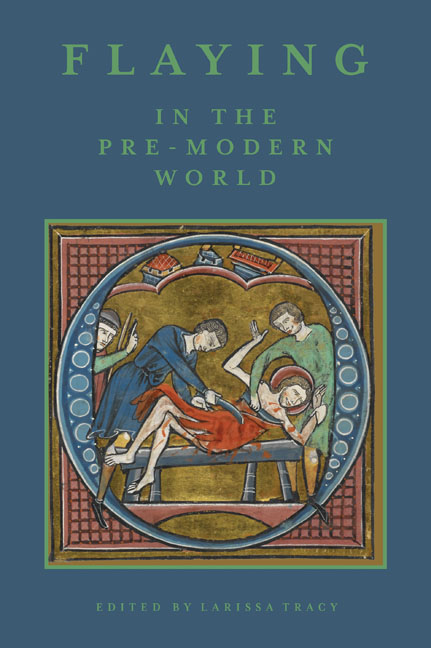10 - No Skin in the Game: Flaying and Early Irish Law and Epic
Published online by Cambridge University Press: 21 May 2021
Summary
THE flaying of the human body features only marginally in the traditions of early medieval Ireland. Ireland is celebrated for its precocious and rich medieval vernacular literature, prominent in which are the epic tales of cattle-raids, wooings, exiles and violent deaths. Yet there was also a substantial body of literature written in Latin, saints’ lives and homilies, as well as vernacular adaptations from comparable Latin sources. It is in this latter corpus that the motif of flaying finds its fullest expression, with debatable resonances in the native tradition. This spectacular process, combining cruelty and the possibility of entertainment, is one of the more garish reifications of the human body – a divestment of personal form and integrity, and a removal of that which envelops our head, limbs and trunk, like the dissolution of a human community through total cultural loss. In contrast to the disintegration implicit in flaying, early Ireland was culturally integrated and homogeneous, with a common literary language and corpus of tradition, lore and history, and displaying a distinct awareness of nationhood.
In the medieval Irish adaptation of a Latin version of the Greek martyrdom of the apostle Bartholomew that is found in a collection of New Testament apocrypha, the irate pagan king Astreges orders Bartholomew's execution after the apostle has converted his royal brother, Polymius, and brought about the destruction of the people's idols in Albanopolis, Armenia.
Ro-dluig in rig a étach corcarda ann-sin, ⁊ atbert fri-a múintir, in t-apstal do thuarcain o shúnd ar tus ⁊ a fhennad iarum, ⁊ a dichendad o chloideb fa-deóid. Tancatar tra na sacairt ⁊ téglach in rig do shaigid in apstail iar sin, co r-thuaircset he di-a ndornu, ⁊ do flescaib némnechu ⁊ do sonnaib iarnaigib, co ro-erig a fheoil ⁊ a lethar de uli, ⁊ e-sium beos oc procept do’n popul ⁊ do lucht a marbtha fesin. Ro-fhendsat he iar sin, ⁊ bensat a chroicend de, amal cech n-anmunda n-indligtech, ⁊ ro-fhuaigset a chroicend imme doridisi co ndelgi spíne ⁊ sciach eterru. Atberat araile co tartsat fair fén a chroicend do iumochar fiarut na cathrach, dia creicc for indmas doib-sium. Do-riacht tra aroile fer díb chuice iar-tain co cloideb lomm i n-a láim, ⁊ do-rat dar a bragait do’n apstal de, co nu-s-dichend he amal-sin.
- Type
- Chapter
- Information
- Flaying in the Pre-Modern WorldPractice and Representation, pp. 261 - 284Publisher: Boydell & BrewerPrint publication year: 2017



